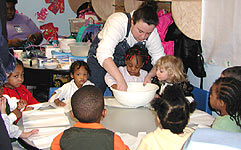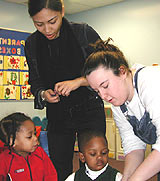What Our Graduates Have to Offer
The following is a list of skills and knowledge our students are able to demonstrate upon completion of the core program courses:
Skills

- The ability to observe human behavior accurately and objectively, report findings orally or in written form.
- A repertoire of basic helping skills including relationship building, active listening, confrontation, problem resolution, and crisis intervention.
- Case Management, including organization of historical information, assessing client strengths and problems, goal setting and case planning.
- Self Assessment; the ability to accurately evaluate personal effectiveness changes and make necessary changes.
- Basic work skills including reporting to work on time, keeping appointments, preparing for supervisory conferences, planning and organizing work, meeting deadlines, and accepting criticism as part of the learning process.
- Group participation skills: the ability to work together with others, playing various roles (i.e. leader, follower, enabler, etc.) in order to achieve common goals.
Knowledge

- Self-awareness; through intensive and consistent work in seminars. Human services students examine their values and the relationship of their values to their career choice.
- Group process; students study and observe group dynamics in class and at fieldwork.
- Agency structure; through direct experience human services students study various roles and responsibilities of professional helpers as individual and team members.
- Confidentiality/professionalism; human services graduates understand the concept of professional confidence and are able to handle confidential materials in a responsible way.
- The Human Services System; human services graduates have a broad base of knowledge about community resources and services; the referral process, and how the various agencies relate to each other in providing services.
- Models of helping; human services graduates have studied and evaluated various models of helping, as well as methods and techniques used by professionals in the community.
- Community change; human services students study how change takes place in the community and understand the factors in individuals and institutions that promote or hinder change processes.
- The politics of human services; human services graduates have studied various political and parapolitical organizations in the community and understand how they relate to the structure of, and events in, the community as a whole.
- Community structure; human services students study the sub-populations within this community (ethnic, religious, urban, suburban, and special interest groups for example) and how they relate to the structure of, and events in the community.
In addition to their core courses, all human services graduates take an additional 44 credit hours in the social sciences, humanities, math, science and general electives. These courses are chosen carefully with the advice of department faculty.
Contact Information
Downtown Campus
Sixth Floor, Room 674
321 State Street
Rochester, New York 14608
M - F 8:00 am - 4:00 pm
(585) 685-6008
Email Hellene Lovett
Human Services Fieldwork Coordinator
Robin Richardson
Downtown Campus
Sixth Floor, Room 674, Room H

